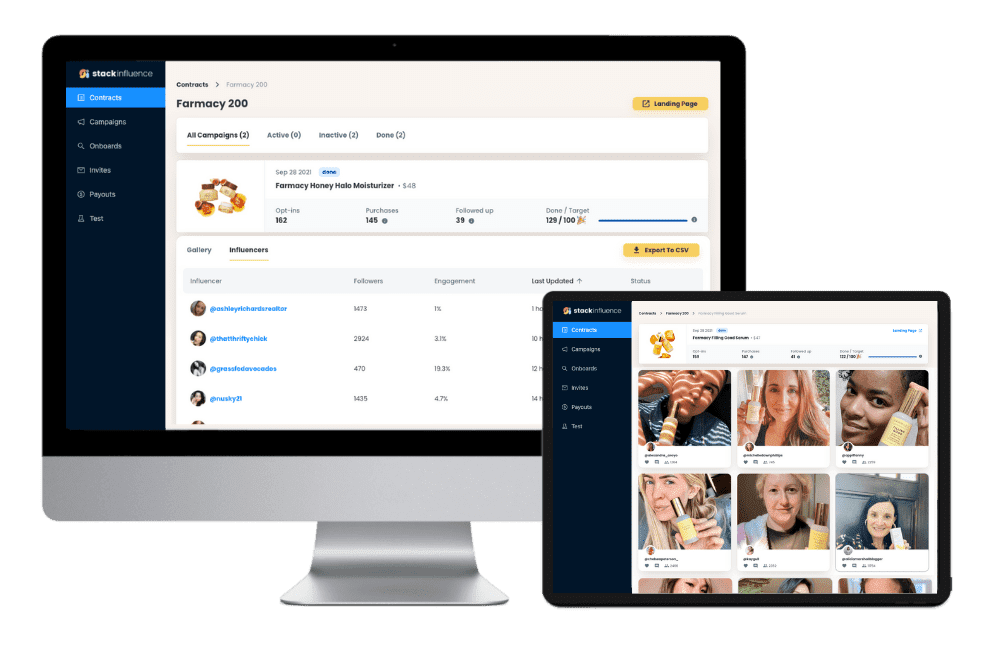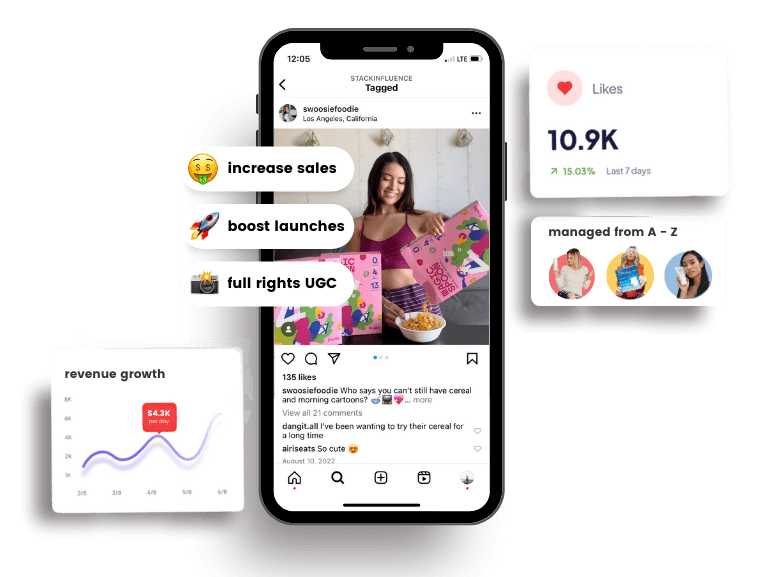10 Reality Stars Who Are Now Internet Stars
27th
October, 2025
Influencer Marketing
Amazon Marketplace
Artificial Intelligence
TikTok Tips
Reality TV has proven to be a launchpad for a new kind of celebrity: the internet star. Many former reality show personalities have leveraged their on-screen fame into massive social media success, transforming themselves into influential content creators and internet stars in their own right. These reality alumni have accumulated millions of followers, built personal brands, and monetized their online presence through influencer marketing deals, e-commerce ventures, and user-generated content. In this blog, we’ll spotlight 10 reality stars who are now internet stars, showcasing how they turned transient TV fame into lasting digital influence.
From mega-famous names to niche fan favorites, each of these individuals illustrates a unique journey from reality show participant to social media internet star. Let’s count down ten notable examples and see how they’ve made the transition:
1. Kylie Jenner
Reality Show Origin
Keeping Up with the Kardashians (KUWTK) – debuted at age 10.
Internet Stardom
The youngest Kardashian-Jenner sibling, Kylie Jenner, rose from reality TV kid to one of the biggest internet stars on the planet. With over 398 million Instagram followers (one of the highest in the world), Kylie leveraged her TV exposure to launch Kylie Cosmetics in 2015 and drove millions in sales through social media hype. By age 23 she was arguably the world’s youngest self-made billionaire, using her massive online following to promote her makeup and skincare lines. Kylie’s posts – from glamorous fashion shoots to intimate family moments – generate engagement in the millions. She’s reportedly able to charge nearly $1 million for a single sponsored Instagram post, reflecting her status as an internet star and trendsetter. Beyond Instagram, Kylie has expanded into other platforms and even started a Kylie Cosmetics Amazon storefront, exemplifying the synergy between reality fame and e-commerce success.

Unlock the Power of Micro Influencers and Elevate your Brand Today!

2. Kim Kardashian
Reality Show Origin
Keeping Up with the Kardashians – main cast member since 2007.
Internet Stardom
Kim Kardashian is often credited with pioneering the modern influencer phenomenon. After becoming a household name on reality TV, Kim parlayed her celebrity into a multi-billion-dollar brand empire. She has around 350 million Instagram followers and was one of the first reality stars to monetize social media at scale – essentially influencer marketing before it even had a name. Kim’s feed features everything from high-fashion looks and beauty product launches to candid family snapshots. Her businesses (SKIMS shapewear, KKW Beauty, etc.) are heavily promoted through her online channels. Love her or hate her, Kim’s social media pull is undeniable – she’s among the most recognizable women on the internet. Brands large and small clamor to collaborate with her, even at the rumored rate of $1+ million per sponsored post. By turning her reality persona into a social media powerhouse, Kim set the template for reality stars to become mega internet stars.
3. Khloé Kardashian
Reality Show Origin
Keeping Up with the Kardashians – main cast member.
Internet Stardom
Initially known as the outspoken, funny Kardashian sister on TV, Khloé Kardashian has forged her own path as an influencer and entrepreneur online. She boasts over 311 million Instagram followers, putting her among the top followed personalities globally. Khloé used her reality TV notoriety and personal “revenge body” fitness journey to launch ventures like the Good American fashion line, which she actively promotes on social media. Fans connect with Khloé’s more unfiltered, relatable tone – she often shares workout routines, motivational quotes, and candid snippets of her life as a mom. This authenticity, combined with her glamour, has made her a social media icon in her own right. Her product endorsements and brand collaborations (from nutritional supplements to beauty products) frequently trend across platforms thanks to her massive reach. Khloé’s transformation from reality sidekick to standalone internet star underscores how engaging with followers genuinely can build a personal brand beyond a TV show.
4. Lauren Conrad
Reality Show Origin
Laguna Beach and The Hills – MTV reality series in the mid-2000s.
Internet Stardom
Lauren Conrad was one of the earliest reality personalities to successfully “defect” from TV and cultivate a lasting lifestyle brand. After her time on The Hills, Lauren pivoted to fashion and blogging, launching her LC Lauren Conrad fashion line at Kohl’s and a popular lifestyle website. She became a social media influencer before the term was mainstream – by 2013, she had 2 million Instagram followers and a “conrad” empire including multiple clothing lines and bestselling books. Today, Lauren’s Instagram (over 6 million followers) showcases her chic yet accessible style, DIY projects, and motherhood journey, reinforcing the relatable persona fans loved on TV. She’s also co-founded fair-trade online marketplace The Little Market. Lauren’s ability to engage an audience of young women across blogs, Pinterest, and Instagram turned her into a bona fide internet star, proving that a reality TV alum can evolve into a trusted content creator and entrepreneur beyond the screen. Her career trajectory has inspired many other reality contestants to pursue influencer marketing and e-commerce ventures of their own.
5. Nicole “Snooki” Polizzi
Reality Show Origin
Jersey Shore – MTV’s hit reality show (2009 debut).
Internet Stardom
Nicole Polizzi, better known as “Snooki,” went from partying at the Jersey Shore to building an influential personal brand online. During the show’s heyday, Snooki was a pop culture sensation, and she’s managed to keep that momentum on social media. She has over 17 million Instagram followers, where she entertains fans with a mix of humorous throwbacks to her wild Shore days and updates on her current life as a mom of three. Snooki has successfully launched ventures like The Snooki Shop (her clothing boutique) and a podcast, using her social platforms to drive traffic and sales. Fans appreciate how she’s evolved from a reality TV party girl to a down-to-earth, funny, entrepreneurial mom while staying true to herself. Snooki frequently collaborates with brands (from dietary supplements to beauty products) and appears at events, leveraging her internet star status. She’s a great example of a reality star who turned fleeting TV fame into a long-term role as a content creator and influencer.
6. JoJo Siwa
Reality Show Origin
Dance Moms – appeared as a young dancer in Seasons 5–6.
Internet Stardom
JoJo Siwa is a prime example of a Gen-Z reality alumna who became an internet superstar. She first caught the public’s eye on Dance Moms with her oversized hair bows and big personality. After leaving the show, JoJo exploded on YouTube and beyond, transforming into a multimedia teen sensation. She currently commands about 11 million Instagram followers and a whopping 45+ million on TikTok – an enormous audience she’s built by consistently creating upbeat, kid-friendly content. JoJo leveraged her online fame into merchandising (she even has her own branded toys and Target product lines), a music career, and TV appearances. Recently, she’s been rebranding her image as she grows up, but her influence remains strong across platforms. From vlogs and music videos to interactive TikTok challenges, JoJo’s colorful online presence has made her one of the most prominent internet stars to emerge from a reality TV background. Her success also highlights how younger audiences and content creators can drive trends outside of traditional Hollywood.
7. Bethenny Frankel
Reality Show Origin
The Real Housewives of New York City – original cast member, 2008 debut.
Internet Stardom
Bethenny Frankel turned her Bravo reality fame into a multifaceted career that spans entrepreneurship, TV, and the internet. Already known for her unfiltered one-liners on RHONY, Bethenny used that fame to launch the Skinnygirl Cocktails brand (which she sold for a reported $100 million) and establish herself as a business mogul. In recent years, she’s also become a notable social media personality. Bethenny has about 4 million Instagram followers and has gained attention on TikTok for her candid product reviews and no-BS advice on beauty and business. Fans appreciate her blunt, humorous takes – her TikTok beauty reviews of drugstore makeup went viral for their honesty. Bethenny’s Instagram and podcast further showcase her life as a successful single mom and philanthropist (she runs the BStrong disaster relief initiative), adding depth to her personal brand. By blending savvy business content with reality TV realness, Bethenny maintains status as a relevant internet star years after her reality TV debut. Her journey underscores how influencer marketing isn’t just for the young – even established entrepreneurs can harness social media to connect with new audiences.
8. Jonathan Van Ness
Reality Show Origin
Queer Eye (Netflix reboot) – grooming expert on the Fab Five.
Internet Stardom
Jonathan Van Ness (JVN) became a breakout reality star with their charisma and positivity on Queer Eye, and they’ve extended that stardom into a vibrant online presence. JVN’s uplifting personality – a mix of humor, fabulous style, and advocacy – has earned them 5.4 million Instagram followers and a devoted fanbase. On social media, JVN shares everything from ice-skating practice videos and gym workouts to glamorous makeup transformations. They’re also a prolific content creator: hosting the popular podcast Getting Curious, publishing memoirs, and launching a gender-inclusive haircare line called JVN Hair. All of these endeavors are promoted to their followers with JVN’s signature blend of wit and heart. As a non-binary, LGBTQ+ advocate, JVN uses their platforms to spread messages of self-care and equality, proving that internet stars can drive social change as well. Jonathan’s evolution from reality TV hairstylist to full-fledged influencer and entrepreneur illustrates the power of authenticity in building an online brand. They engage fans across Instagram, TikTok, and Twitter, ensuring that the feel-good UGC (user-generated content) spirit of Queer Eye lives on digitally.
9. Christine Quinn
Reality Show Origin
Selling Sunset – Netflix reality series about luxury real estate, seasons 1–5.
Internet Stardom
Christine Quinn turned heads as the bold, fashion-forward “villain” on Selling Sunset, and she’s parlayed that notoriety into internet fame beyond the show. With her striking style and flair for drama, Christine quickly amassed over 4 million Instagram followers during her time on the series. Her Instagram feed is a glossy showcase of haute couture outfits, behind-the-scenes glimpses of high-end real estate, and cheeky jabs at her on-screen persona. Christine has effectively built a personal brand around being the glamorous rebel – she even authored a book, How to Be a Boss B**h*, to capitalize on her empowered image. After leaving the show, she’s continued collaborating with fashion and beauty brands, using her social clout to become a modern style influencer. Fans follow Christine for aspirational luxury content with an irreverent twist, keeping her relevant as an internet star even post-reality TV. In fact, she’s now one of the most-followed real estate personalities online. By embracing her reputation and connecting with fans on social media, Christine proved that even reality TV antagonists can transform into sought-after influencers.
10. Paris Hilton
Reality Show Origin
The Simple Life – iconic early 2000s reality series (debuted 2003).
Internet Stardom
Long before Instagram existed, Paris Hilton was famous for being famous – and she has smoothly transitioned from early reality TV stardom to modern internet influencer. Dubbed “Hollywood’s original influencer,” Paris starred in The Simple Life and became a household name nearly two decades ago. Today, she remains a force online with over 27 million Instagram followers and strong presence on Twitter, TikTok, and YouTube. Paris has reinvented herself as a savvy businesswoman and DJ, all while maintaining a glamorous public persona. She often credits herself as having “put the ‘i’ in influencer,” and indeed she was ahead of the curve in branding her lifestyle. On social media Paris shares everything from throwback memes (“That’s hot”) to snapshots of her weddings and business ventures, engaging a multi-generational fanbase. She has launched product lines like fragrances, skincare, and a digital wearables NFT collection, promoting them heavily to her followers. Paris’ longevity as an internet star shows how a reality TV origin can be just the beginning – with adaptability and marketing savvy, she has stayed culturally relevant from the MySpace era to the TikTok era. As she famously said, “The only rule is don’t be boring and dress cute wherever you go. Life is too short to blend in.”
The Power of Influencer Marketing: From Reality TV to Internet Fame
These ten individuals demonstrate how reality TV can serve as a springboard into long-term success as internet stars. A few key takeaways for brands and aspiring influencers:
-
- Authenticity and Personal Branding: Each star found a unique voice or niche (beauty mogul, fitness inspiration, comic persona, etc.) and consistently delivered content that resonated with their audience. Authentic storytelling helped them convert viewers into loyal followers.
- Monetizing via Influencer Marketing: Leveraging their large followings, these reality alumni partner with brands for sponsored posts, product lines, and endorsements. This illustrates the power of influencer marketing – people are often more engaged by relatable content creators than traditional ads. Brands can tap into an influencer’s trust factor to reach consumers in a more organic way.
- Micro Influencers Matter Too: Not every brand can afford a Kardashian-level influencer. However, working with micro influencers (those with smaller but highly engaged followings) can be just as effective. Many content creators from reality shows start as micro influencers before growing, and they often maintain strong engagement. For businesses (from trendy startups to Amazon sellers), collaborating with a network of micro influencers can drive credible word-of-mouth promotion.
- E-commerce and Product Lines: A number of these stars launched their own products (fashion lines, cosmetics, etc.) and used their platforms to drive e-commerce sales. This direct line to consumers showcases how influencers can merge content and commerce. Even brands on Amazon can boost visibility by having an internet star showcase their product to millions of potential buyers in an authentic way.
- UGC and Community Building: These influencers excel at creating a sense of community. Whether it’s JoJo Siwa’s young fans doing dance challenges or Bethenny Frankel’s followers tuning in for frank advice, the user-generated content (UGC) and interaction around their posts amplify their reach. Brands should encourage influencers to incorporate UGC – it increases engagement and trust as followers see real people participating.
- Authenticity and Personal Branding: Each star found a unique voice or niche (beauty mogul, fitness inspiration, comic persona, etc.) and consistently delivered content that resonated with their audience. Authentic storytelling helped them convert viewers into loyal followers.
For brands looking to connect with influencers – big or small – the success of these reality-turned-digital stars is a case study in what’s possible. A strategic influencer campaign can harness the public’s existing interest in a reality star and translate it into authentic promotion. Platforms like Stack Influence can help streamline this process, connecting companies with the right influencers (including micro influencers and UGC creators) to amplify marketing efforts. The world of influencer marketing is more diverse than ever, from reality TV royalty to niche content creators, and it offers exciting opportunities for those who know how to leverage it.

Unlock the Power of Micro Influencers and Elevate your Brand Today!

Conclusion to 10 Reality Stars Who Are Now Internet Stars
In summary, these 10 reality stars who are now internet stars show that with the right mix of personality, platform, and persistence, a stint on reality television can evolve into a thriving career in the digital spotlight. Brands and creators alike can learn from their journeys – after all, in the age of social media, everyone has the chance to become an “internet star” with an audience that values what they have to say.

By William Gasner
CMO at Stack Influence
William Gasner is the CMO of Stack Influence, he's a 6X founder, a 7-Figure eCommerce seller, and has been featured in leading publications like Forbes, Business Insider, and Wired for his thoughts on the influencer marketing and eCommerce industries.
Want new articles before they get published? Subscribe to our Awesome Newsletter.
stack up your influence
turning creativity into currency
our headquarters
111 NE 1st St, Miami, FL 33132
our contact info
[email protected]
stack up your influence
turning creativity into currency
our headquarters
111 NE 1st St, 8th Floor
Miami, FL 33132


